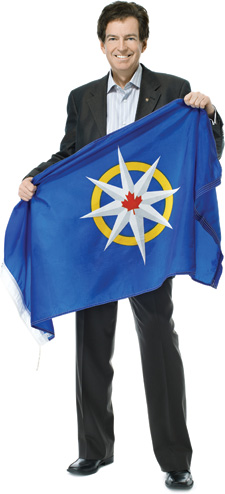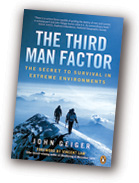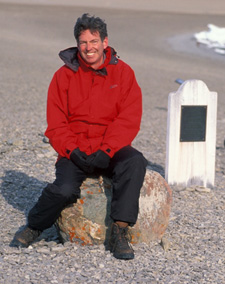[Extended version of the interview that appeared in the Spring 2011 issue of New Trail .]
John Geiger-author, journalist, Arctic explorer, and now president of the Royal Canadian Geographical Society-talks with U of A graduate student Megan Highet about exploration in the 21st century, the final vestiges of Canada's frontier, and his own extreme adventures.
I understand that your interests lie primarily in the Arctic, what initially drew you to the North?
I have a family history in the North. As a young person I went up to visit my grandfather in Uranium City. So I saw firsthand - before I was 10 - what the North was like, and I was intrigued by this outpost in far northern Saskatchewan.
Also, my family goes back in Canada to the 1600s. I've got Aboriginal heritage and voyageur heritage. I guess my family and I feel that we've been wrapped up in Canada for a long time.
You were recently elected president of the Royal Canadian Geographical Society. These days, exploring our own world feels like a relic of the 20th- even the 19th- century. What role do you think the Society serves in the 21st?
Had you asked that question 15 years ago, you would have been dead on. The discipline of geography was waning. There were fewer people enrolled in geography programs, which were very much still linked to physical geography. But there have been some radical developments since then.
Climate change has altered the way geography is viewed. Because, as a discipline, it can encompass a wide range of pursuits, it's proven to be a wonderful umbrella for research into climate change. We've been involved with everyone from climatologists to anthropologists. Suddenly geography has become the discipline that is on the edge of research.
Clearly climate change is the great challenge of our century. It's going to have an effect that I don't think most people can begin to conceive of - and on the Arctic regions in particular. And that leads to the question of northern sovereignty, because, with the effects of climate change, suddenly the ocean floor up there can be a source for oil and gas explorations and the Northwest Passage can suddenly become a year-round navigable trade route. These things are going to have a profound effect on the ecology of the North and the people who live in the North, and so these are areas that are of great importance to all Canadians.
I do think that stuffy neo-Victorian view of geography prevailed for some time, but it's certainly been overtaken by a very serious need to understand changes that are happening to our planet and how those changes are affecting not only the physical geography and climate and so forth, but also the people who live in many parts of the world and are being affected by that, so it touches human geography as well.
Geography is suddenly one of the most relevant disciplines, and you certainly see that in the large numbers of people who are entering geography programs. Our organization has been invigorated by this influx.
Are there any new wild frontiers left for us to explore?
Certainly for every individual there are wild frontiers unexplored. It's true that humanity has, over centuries, gradually charted coastlines and constructed maps, but for each individual Canadian there is a vast and uncharted country there in terms of the opportunities for their own exploration. I don't think it's a process that ever ends. In fact, most of the Earth is unexplored because most of the Earth is under the ocean, and that's an area that people have barely touched upon.
It's not only about science pushing back the frontiers of knowledge, it's also about personal explorations and journeys, as Canadians come to understand their own country and landscape and geography and ecosystem - all things they ultimately have to take responsibility for.
You're very well-travelled yourself. What have been your own personal frontiers?
I've been to the Canadian Arctic and undertaken field research there. I've also, just because of my own interest, travelled to all sorts of places in the North: the Northwest Territories, Nunavut and Greenland. I've been to Lapland and Antarctica and South Georgia, which is the Serengeti of the Polar Region. It's a magical, unbelievable place. I remember standing on a beach with this absolute army of King penguins - half a million it seemed - and fur seals and elephant seals and the smaller Chinstrap penguins and so forth. It's really an extraordinary part of the world, and it's very seldom visited.
I'm very interested in Polar Regions as they are the most fragile and least-understood landscapes on the planet. They're also the least visited, so that interests me. I like to be in places where you really do have a feeling that you're alone. You may be with a group of people, but really you're isolated from the main throbbing mass of humanity.
Well, the third man factor refers to an experience that Sir Ernest Shackleton, the great British Antarctic explorer, had after his ship, Endurance, was trapped and crushed in the ice. He was able to successfully extract his crew from what would have been certain death using small boats to sail them first to a place called Elephant Island. Then Shackleton took a small crew with him over some of the most tempestuous waters in the world to this little island called South Georgia, and there they cross an uncharted mountain range to reach a whaling station.
It was in the process of that final leg that he and two other men who were part of this group experienced a sense of an unseen presence. So for them, it was actually the fourth man that had joined them and encouraged them along and really was a party to their salvation, as Shackleton recorded in his memoir, South. Later, the great poet T.S. Eliot made reference to this in his poem "The Wasteland," although he called it "the third" presence.
Essentially, it's a sense that an unseen incorporeal being has joined you during a time of tremendous stress and has aided you in your survival. It's happened to aviators, astronauts, climbers, shipwreck survivors, 9/11 survivors, solo sailors and polar explorers.
It's a very compelling idea because it seems that people who might otherwise die are able to reach out and receive the comfort and psychological support of another person even though that person is, by any normal measurement, not actually present. They are experiencing friendship, companionship, encouragement, and advice from what appears to be to them a vivid person, and, yet, to a dispassionate observer, that person does not exist.
Clearly the third man factor is a response - probably a neurological response - to an extreme environment and extreme stress, and it provides psychological comfort. It's a coping mechanism to people who are confronting life-and-death situations.
Have you ever experienced this personally?
No, but I have had-in the field-a sense of detachment from myself during stressful situations.
Once, as a child, I was out in a very arid part of southern Alberta with my father, Kenneth Warren Geiger ['55 BSc (MiningEng)], who was a geologist with the Alberta Geological Survey. He was taking studies of the bedrock typology and I was off on my own and encountered a rattlesnake. It was a really stressful few seconds before my father swooped in and rescued me. When I reflect back on that terrifying, stressful experience, I have a sense that I was seeing it from a different perspective, and I'm viewing it as if I'm viewing a film. This is a coping mechanism that is known to psychologists and those who deal with trauma, where people will entirely separate themselves from the scene that is unfolding.
I had it again when I was on Marble Island in Hudson Bay where I was doing research into the 1719 James Knight expedition with Owen Beattie, who is now a professor emeritus of anthropology. We were there for long stretches of time in the summer, and even though it was the warmest time of the year, we got some pretty extreme weather and I became hypothermic, which led to me having a repeat of this phenomenon.
The book has recently been adapted into a documentary film, The Angel Effect, which will air on the National Geographic Channel in the U.S. this spring. Can you tell me about that?
I'm very excited about that. National Geographic is such an iconic organization and its work is so well-regarded in terms of exploration and field science, so it was very exciting for me to have The Third Man Factor - which was a very successful book and is now published in 14 languages - to see that it has inspired this documentary film. The documentary features several of the people I interviewed for the book, such as Gerry Linenger, an American astronaut who had a third-man-factor experience while he was in space, and Ron DiFrancesco, a 9/11 survivor, who had the experience in the World Trade Centre. It's a very powerful film.
You've also written a couple of other successful books about polar exploration: Frozen in Time, about the 1845 Franklin expedition; and Dead Silence, about the disappearance of the Knight expedition in 1719 [both with Owen Beattie]. What is it about Arctic exploration that captivates you?
It's the unknowing. These explorers were at the end of the known world. Of course, I'm using a Eurocentric view of the world. There were Inuit who'd been there for many centuries and knew full well what was there and what they had to contend with. But from a European standpoint these places were really unknown.
When these expeditions sailed they were very serious expeditions. In the case of the Franklin expedition, it had serious scientific aims of being the first to complete the Northwest Passage from the Atlantic to the Pacific Ocean across the north of North America. But beyond that they were undertaking really important scientific research. To this day, some of their reports are used by climate scientists to understand changes to climate between then and now. It was very much the equivalent of the space exploration undertaken in our own lifetimes.
The Franklin expedition and the Knight expedition are tremendously interesting mysteries. In the case of Franklin, you have 129 men, two ships, the best-equipped expedition that the Royal Navy had ever sent, and cutting-edge technologies - all vanished, and to this day they have not been found. Franklin's remains have not been found. His journals have not been found. Only the remains of two- or three-dozen sailors from the expedition have been found - most of them scattered over the gravel of King William Island. So the mystery endures, and there's a powerful draw to people.
I think our research for Frozen in Time had a tremendous impact on public interest in this whole area. It inspired Margaret Atwood's story "The Age of Lead." It inspired Mordecai Richler to include a whole Franklin passage in Solomon Gursky Was Here. It inspired the heavy metal rock group Iron Maiden to do a song based on it. It's just one of those things that has really captured the public imagination. And the research that Owen led resulted in the exhumation of three preserved members of Franklin's expedition. When people can look at images of a Victorian seaman who appears to be alive, it's a really compelling, very powerful experience, and it never ceases to move people.
Why is it important to make northern regions more accessible to the individual, if not by physically being able to go there, then at least through print and other forms of media?
As citizens of Canada, we have a responsibility for a vast proportion of the world. Canada is an enormous landmass, and we are the one's responsible for it. It's a very important trust that we've inherited. Our goal at the Royal Canadian Geographical Society is to bring stories about Canada to the world through Canadian Geographic magazine and Géographica, the French-language equivalent, and various other platforms, such as the websites and social media.
Do you have any specific plans for your tenure as president?I do think that the Society has - historically - done a wonderful job and that's why it's as large as it is. Our magazine is the leader in the country in its category. We reach into schools and help young people learn and celebrate this remarkable country.
Obviously, there are things that we as an organization can improve. One thing we need to do is to go beyond our base, which is in Ottawa. I'm an Albertan, and I feel strongly that we need to have greater presence across the country. We're working diligently towards having events and lectures right across Canada and communicating directly with people in their own cities and towns.
I also think it's important to reach out to new Canadians. The idea of the North is something that likely doesn't touch many of them. They haven't grown up with some of the lore that we have as native Canadians, so it's really important to welcome them into the Canadian family. The Society needs to reflect the diversity of Canada.
We face challenges like all other non-profits, but what I'm excited about is that a society founded in 1929 is perhaps more vital today than it ever has been in its history. So I feel very lucky to be associated with this organization.
Before you became president, you sat on the Society's Expeditions Program Committee for many years. What drew you there?
That ties in directly to my interest in exploration history. It's a great program. It's aimed at anybody who wants to undertake an expedition somewhere in Canada. We've had all sorts of people apply to do everything from bicycle trips to canoe trips to mountain climbs to visits to really extreme places in the country like Ellesmere Island. It's a way for us to reach out into the broader population and tempt Canadians to become more adventurous and celebrate what we have.
Do you have any advice for young, aspiring explorers?
I wish there were more young explorers. It's interesting that Canadians - young people especially - tend to look outside of Canada to other parts of the world for travel experiences. Not enough of them think about places in Nunavut or really isolated parts of Canada. It's an astonishing country with such diversity of cultures, and it's interesting to me that some of the expeditions that we've supported have been led by students coming from places like Australia to explore remote places in Canada. There's a real enthusiasm for people outside of Canada to experience the wonders of our landscape.
My dream is that more Canadians would see that while they may think they know Canada they haven't a clue unless they've been into the Arctic archipelago or Ellesmere Island or Banks Island or communities in the North like Yellowknife or Rankin Inlet. So many of us are huddled within 100 miles of the American border, and that's where we live out our lives. So the idea of the North is there, it's part of our essence, but we don't do enough to explore and learn about it first-hand.
What's next for you?
I've written five books now, and there's usually an overlap, so this is unusual that right now I don't have a book on the horizon. I think it's due in large part to taking on the presidency of the board of a very dynamic organization like this. I'm finding that a lot of the time I previously spent on books is now spent working on Geographic Society business.
Maybe I will take a couple of years here to focus on the Society and its important work, but, having said that, I do have a couple of ideas floating around and I expect that at some point I'll start work on another book. But given the huge success of The Third Man Factor and now with the film coming out, it's been a wonderful time to take a break and bask in whatever glory attaches itself to the book.
In what way has your experience at the U of A set you on your present path?
As an undergrad I studied Canadian history, so obviously that played a role in my awakening to Canada. My father also attended the U of A. He's a geologist, so it's a multi-generational thing. Owen Beattie taught there, so my involvement with Owen - both with the Franklin and the Knight research - was closely tied to the University. We used facilities in what is now the Canadian Circumpolar Institute. And even though I'm now a fellow at Massey College at the University of Toronto and have a great affection for Massey College, my background is the U of A, and I feel a really strong connection to the University. I'm very much a U of A guy.
Interviewer Megan Highet, '05 BA, is a PhD candidate in the Department of Anthropology and is pursuing a career in academia. Her research explores issues of health and well-being in northern boomtown communities, including the frontier population residing in Dawson City during the Klondike Gold Rush.



We at New Trail welcome your comments. Robust debate and criticism are encouraged, provided it is respectful. We reserve the right to reject comments, images or links that attack ethnicity, nationality, religion, gender or sexual orientation; that include offensive language, threats, spam; are fraudulent or defamatory; infringe on copyright or trademarks; and that just generally aren’t very nice. Discussion is monitored and violation of these guidelines will result in comments being disabled.